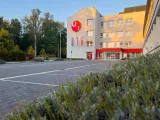Published: 14.11.2024
This year, 14 people from the University of Pardubice placed among the top two per cent of the most cited scientists in the world. Compared to 2020, the University of Pardubice has no fewer than six more names in the current prestigious ranking of researchers in all fields published by Stanford University analysts.
“I consider such representation a success. It proves that our university has great potential in science and research. I am also happy for the new names of researchers who, thanks to their work, have inspired their colleagues worldwide,” said the Rector of the University of Pardubice, Prof. Libor Čapek.
The published data shows where scientists stand throughout their careers. The information includes categories such as the h-index, the number of articles scientists have contributed to and all articles published since 1960. The scientists, covered by the Scopus database, were compiled by PLoS Biology experts from Stanford University and Elsevier.
This year's list contains more than 170,000 names. The prestigious position in the list includes, for example, the name of the former rector of the University of Pardubice, Prof. Jiří Málek, who has devoted his life to physical chemistry, structural relaxation of non-crystalline materials, kinetics of crystal growth in supercooled liquids and the viscosity of chalcogenide glass-forming systems. Together with him, the most cited Prof. Ing. Pavel Jandera, DrSc. worked in analytical chemistry at the same faculty, specialising in analytical separations, high-performance liquid chromatography, and programmed and multidimensional chromatographic techniques.
The university's other most cited scientists are (in alphabetical order) Prof. Filip Bureš, Prof. Libor Dostál, Prof. Petr Hájek, Prof. Michal Holčapek, Prof. Andréa Kalendová, Dr.-Ing. Jan Macák, Prof. Ivan Mikšík, Prof. Ladislav Novotný, Ing. Roman Svoboda, Ph.D., Prof. Ivan Švancara, Prof. Karel Vytřas, and Prof. Svatopluk Zeman.
In addition to Prof. Ing. Petr Hájek, Ph.D., from the Faculty of Economics and Administration, who focuses on artificial and computational intelligence, especially fuzzy systems, all scientists are from the Faculty of Chemical Technology and its institutes or centres. An analytic chemist, Prof. Ing. Michal Holčapek, Ph.D., deals with the lipidomic analysis used for the early detection of some types of cancer. Prof. Ing. Filip Bureš, Ph.D. is devoted to organic chemistry, and his scientific research focuses on conjugated organic molecules and the study of their fundamental physicochemical properties. Dr.-Ing. Jan Macák is a senior researcher at the Centre for Materials and Nanotechnologies, Faculty of Chemical Technology. His research focuses on developing new low-dimensional structures (such as nanotubes, nanofibers, and nanofibrous materials) used, e.g. in solar cells, catalysts, and batteries. Prof. Ivan Mikšík worked at the Department of Analytical Chemistry. Prof. Andréa Kalendová is a scientist at the Department of Chemistry and Technology of Macromolecular Materials focusing on coatings and material protection. Prof. Ladislav Novotný is an academic at the Institute of Environmental and Chemical Engineering, mainly involved in using electrochemistry in environmental protection. Prof. Karel Vytřas worked at the Department of Analytical Chemistry. Four years ago, the Rector of the University awarded him in memoriam the silver Medal of Merit for the University of Pardubice for his significant contribution to the development of electrochemistry at the University of Pardubice.
Prof. Ing. Dr Ivan Švancara is a scientist of the Department of Analytical Chemistry who received the Lifetime Achievement Award for the development of electroanalytical chemistry from the Czech Chemical Society this year. Prof. Ing. Libor Dostál, Ph.D. works at the Department of General and Inorganic Chemistry, Ing. Roman Svoboda, Ph.D. is a researcher at the Department of Physical Chemistry, and Prof. Ing. Svatopluk Zeman, DrSc. is from the Institute of Energetic Materials.


